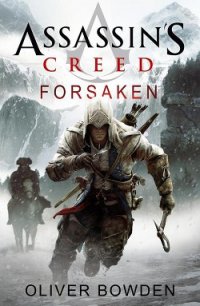Assassin's creed : Black flag - Bowden Oliver (библиотека книг .txt) 📗
FORTY
As I waited for Mary by the gates I overheard guards chatting. Torres had managed to slip away. Interesting. Prins was holed up in his plantation in fear of his life. Good. I hope the fear gripped icy hands at his stomach. I hope the terror kept him awake at nights. I’d look forward to seeing it in his eyes when I killed him.
First, though, to gain entry. And for that I needed . . .
There she was. You had to hand it to her, she was a superb actor. For God knows how long she’d convinced all of us that she was a man, and now here she was in a new role, not changing sex this time but convincing the guards she was ill. And yes, doing a bloody good job of it.
“Stand your ground!” ordered a soldier at the gate.
“Please, I’ve been shot,” she rasped. “I need aid.”
“Christ, Phillips, look at her. She’s hurt.”
The more sympathetic of the two soldiers stepped forward and the gate to the plantation opened in front of her.
“Sir,” she said weakly, “I’m poorly and faint.”
Sympathetic Soldier offered her his arm to help her inside.
“Bless you, lads,” she said and limped through the gate, which closed behind them. I didn’t see it from my vantage point, of course, but I heard it: the swish of a blade, the muffled punching sound it made as she drove it into them, the low moan as the last of life escaped them, then the thump of their bodies on the dirt.
Now we were both inside and darting across the compound towards his manor. Probably we were seen by slaves, but we had to hope they wouldn’t raise the alarm. Our prayers were answered because moments after that we were creeping into the manor, using hand signals to move stealthily around the rooms—until we came across him standing in a gazebo in a rear yard of the house. Crouched on either side of an archway, we peeked around the frame and saw him there, standing with his back to us, his hands across his stomach looking out over his grounds, pleased with his lot in life, a fat slaver, his fortune built on the suffering of others. You remember me saying I’d met some who were all bad? Laurens Prins was top of that list.
We looked at one another. The kill belonged to her and yet, for some reason (because they were trying to recruit me?), she waved me onward. I stood, went through to the yard, crept beneath the gazebo and stood behind Laurens Prins.
And engaged my blade.
Oh, I kept it well greased; the one thing you can be sure of when it comes to pirates is that while we may not be a particularly domesticated breed, we kept our weapons in good condition. It was the same philosophy as keeping the galleon ship-shape. A question of need, of survival.
So it was with my blade. When it got wet I cleaned it thoroughly, and I kept it greased to within an inch of its life, and so these days it barely made a noise when I ejected it. It was so quiet, in fact, that Prins didn’t hear it.
I cursed, and at last he turned in surprise, perhaps expecting to see one of his guards there, about to shout at the man for his impudence, creeping up on him like that. Instead I thrust the blade into him and his eyes opened wide in surprise, frozen like that as I let him down to the floor, keeping the blade in him, holding him there as blood filled his lungs and the life began to leave him.
“Why hang over me like a leering crow?” he coughed. “To see an old man suffer?”
“You’ve caused no small portion of suffering yourself, Mr. Prins,” I told him dispassionately. “This is retribution, I suppose.”
“You absurd cut-throats and your precious philosophy,” he jeered, the final pathetic contempt of a dying man. “You live in the world, but you cannot make it move.”
I smiled down at him. “You mistake my motive, old man. I’m only after a bit of coin.”
“As was I, lad,” he said. “As was I . . .”
He died.
I stepped out of the gazebo, leaving his body behind, when I heard a noise from above me. Looking up, I saw on a balcony The Sage, Roberts, just as I remembered him. He held Mary hostage, with a flint-lock pistol aimed at the side of her head and—clever lad—he held her wrist to stop her engaging her blade.
“I found your man,” she called down, seemingly unconcerned about the pistol at her forehead. He’d use it too. The heat in his eyes said so. They blazed. Remember me, do you, mate? I thought. The man who stood by while they took your blood?
He did. “The Templar from Havana,” he said, nodding.
“I’m no Templar, mate,” I called back, “that was just a ruse. We’ve come here to save your arse.”
(By which, of course, I meant, “Torture you until you tell us where The Observatory is.”)
“Save me? I work for Mr. Prins.”
“Well then he’s a poor man to call master. He meant to sell you out to the Templars.”
He rolled his eyes. “You can’t trust anyone, it seems.”
Perhaps he relaxed, for Mary chose that moment to make her move. She dragged the heel of her boot down his shin and he cried out in pain as she twisted to one side and from underneath his grasp. She flailed for his gun arm but he whipped it away, aimed and fired but missed. Now she was off balance and he saw his chance, pivoting on the rail of the balcony and kicking her with both feet. With a yell she flipped over the rail and I was already starting forward to try and catch her when she caught herself and swung into the balcony below.
Meanwhile, The Sage had drawn another pistol, but guards were arriving, alerted by the gunfire.
“Roberts,” I shouted, but instead of shooting at the guards he aimed his second shot at the bell.
Clang.
He couldn’t miss, and it had the desired effect: as Mary dropped lithely down from the second balcony to join me, engaging her blade at the same time, guards came pouring from the archways into the courtyard. Back-to-back we stood but there was no time to appraise our enemy at leisure. Muskets and pistols were being produced, so into action we sprang.
Six each, I think, was the tally. Twelve men who died with varying degrees of bravery and skill, and at least one case of dubious suitability for any kind of combat. It was the way he screwed up his eyes and whimpered as he came running into battle.
We heard the running feet of more men arriving and knew that was our cue to escape, dashing from the courtyard, then across the compound, urging the slaves to run, run, free themselves, as we went. If there had not been scores of soldiers on our tails, then we would have stopped and forced them to escape. As it was, I don’t know whether they pressed home the advantage we’d given them.
• • •
Later, when we stopped and I was done cursing my luck at losing Roberts, I asked her real name.
“Mary Read to my mum,” she answered, and at the same time I felt something press into my crotch and when I looked down, saw that it was the point of Mary’s hidden blade.
She was smiling, thank God.
“But not a word of it to anyone,” she said. “Or I’ll unman you as well.”
I never did tell anyone. After all, this was a woman who knew how to piss standing up. I wasn’t about to underestimate her.
FORTY-ONE
JANUARY 1718
Dear Edward,
I write with sad news of your father, who passed away one month ago, taken by pleurisy. His passing was not painful, and he died in my arms I am pleased to say. So at least we were together until the very end.




